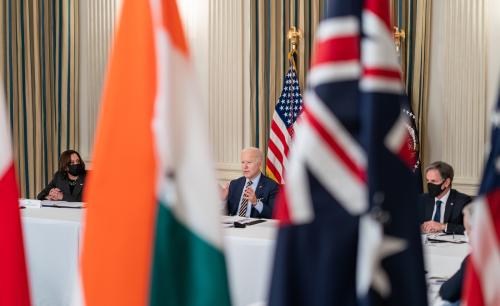

2:00 pm EDT - 3:30 pm EDT
Past Event
2:00 pm - 3:30 pm EDT
1775 Massachusetts Ave., NW
Washington, DC
Legal and technology experts hosted a policy discussion on how drones and forthcoming Federal Aviation Agency regulations into unmanned aerial vehicles will affect Americans’ privacy, safety and the country’s overall security on April 4, 2012 at Brookings. The event followed a new aviation bill, signed in February, which will open domestic skies to “unmanned aircraft systems,” more commonly known as drones. In the weeks following, many concerns about the bill’s implications have been raised: for instance, to what extent will it be legal for drones to hover 300 feet above residential neighborhoods snapping pictures into backyards and windows? What level of human-in-the-loop control is needed to ensure safety in a crowded airspace? And how can we stop terrorists from piloting drones at treetop level toward a target?
“It’s important to open the skies to drones, and welcome them, but with an open eye towards the safety, national security and privacy issues,” said John Villasenor, nonresident senior fellow in Governance Studies and professor at UCLA. He also cautioned that reducing the number of drones also reduce concerns, but would also lower the economic benefits and stifle innovation.
Villasenor raised concerns over safety. “The sheer mathematics of the numbers mean we’re going to have some hiccups along the way…It is almost unimaginably complex to think about how in the world we’re going to successfully navigate the safety challenges of potentially tens of thousands of these unmanned aviation systems operated in unconventional locations and used for all these different tasks.”
“When people hear the word ‘drones’ they don’t think of domestic law enforcement or news gathering,” said Benjamin Wittes, senior fellow in Governance Studies and moderator of the panel. “They think about predators. “
“We are not opposed to the use of domestic drones,” said Catherine Crump, an attorney for the American Civil Liberties Union. “There are a broad range of uses for this technology to meet legitimate law enforcement needs. At the same time, we are concerned that they not become tools of general or pervasive surveillance.” Crump also advocated for a robust debate on the rules governing the public and private use of drones.
Paul Rosenzweig, visiting fellow at The Heritage Foundation, stressed that a legal framework must be developed so that the benefits of drones can be allowed. “You can, and should, anticipate the potential for abuse, but instead of relying upon inefficiency and resource limitations … you have to invest the resources and figure out what the rules are.”
“We don’t disarm the police because of a potential for police abuse because of weapons. We try and hire the right people, we give them good training, we have internal affairs bureaus that examine every shooting, we discipline the people who do it badly, we fire those that do it badly more than once, and we prosecute those who do it badly in ways that violate more important social norms. That model will apply to the use of drones in the government sector.”
Kenneth Anderson, nonresident senior fellow in Governance Studies and law professor at American University, spoke about private party drones and how the lawmakers should use public dialogue and thought about how to manage concerns with these new technologies. “Ultimately the best thing that could happen in the private to private interactions would be some sort of a model set of laws, aimed at states for their adoption, in which we had a discussion up front about what the tradeoffs need to be between exposure and privacy. The worst thing would be to allow the laws to be driven by a series of really ugly cases in which we have not thought about the tradeoffs.”
In February, President Obama signed an aviation bill that will open domestic skies to “unmanned aircraft systems,” more commonly known as drones. The coming proliferation of domestic drones raises a set of important privacy, safety, and national security questions. For instance, to what extent will it be legal for drones to hover 300 feet above residential neighborhoods snapping pictures into backyards and windows? What level of human-in-the-loop control is needed to ensure safety in a crowded airspace? And how can we stop terrorists from piloting drones at treetop level toward a target?
After the program, speakers took audience questions. Participants followed the conversation on Twitter using the hashtag #BIDrones.


Tanvi Madan
October 22, 2022
2022
Online Only
12:00 pm - 1:30 pm EDT

Sarah Kreps, Richard Li
February 1, 2022